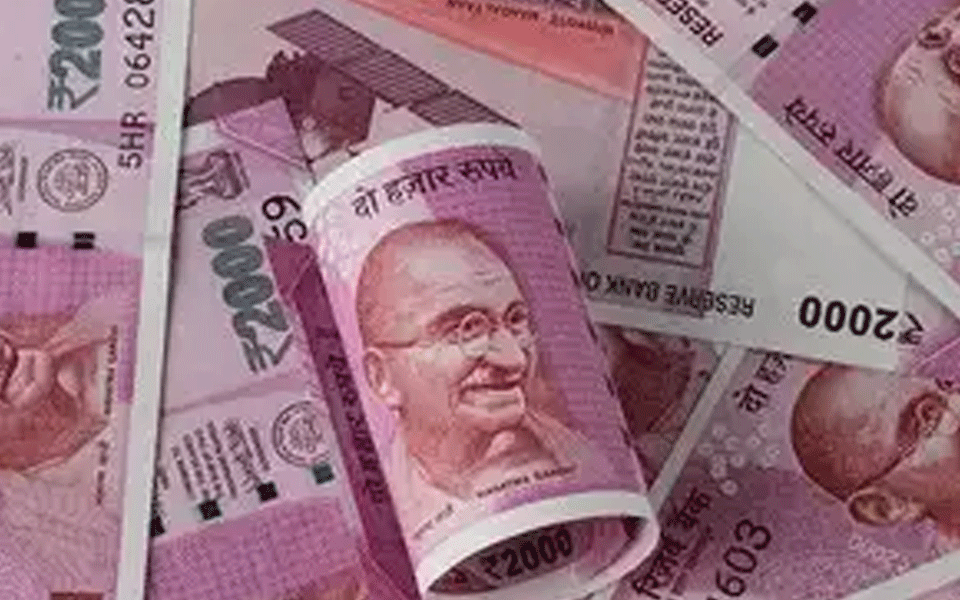New Delhi, Aug 21 : The Central government is likely to meet its fiscal deficit target on the back of robust economic growth, along with higher tax compliance and "zero" revenue loss in Goods and Services Tax (GST), a senior Finance Ministry official said on Tuesday.
"There will be no shortfall in fiscal deficit target. We will meet the fiscal deficit target. Income tax collection is robust, first quarter results of the corporate world is absolutely delightful. I don't see any reason for any concern on fiscal deficit," the official said here.
The 2018-19 fiscal deficit -- the difference between revenue and expenditure -- has been pegged at Rs 6.24 lakh crore, as compared to the revised estimates of Rs 5.94 lakh crore for the previous fiscal.
The official pointed out that the revenue from divestment will exceed the target of Rs 80,000 crore this fiscal. Even during the last fiscal, the Central government had exceeded its collection target from divestment.
On the GST, the official said: "I believe tax compliance and revenue buoyancy because of demand growth will almost result in 'zero' revenue loss despite the recent deductions in rates done to protect and promote sectors like textile, exports and handicrafts."
The government has targeted a monthly revenue of Rs 1 lakh crore from the GST collection.
The Finance Ministry had earlier announced that the revenue collection under GST crossed the Rs 95,000 crore-mark for the second month in a row and stood at Rs 96,483 crore for the month of June (collected in July).
In a relief for common man, the GST Council in its meeting last month reduced tax rates on over 50 items including refrigerators, washing machines and small televisions, which would now be taxed at 18 per cent, down from the current 28 per cent.
Further, the official said that state governments have shown reluctance to include petrol and diesel in the GST basket, as they predict the move to curtail their overall revenue streams.
According to the official, the state governments are not willing to include petrol and diesel under the GST ambit as they would like to retain certain financial autonomy.
Besides, the official said that some state governments also utilise the taxes generated from petroleum products for infrastructure development.
The Central government is open to the idea of including the two main transport fuels in the GST basket as it will aid in bringing down prices and the overall inflation.
Recently, the prices of the two key transport fuels have risen due to higher crude oil prices and the rupee depreciation.
On August 14, the data on the Wholesale Price Index (WPI) furnished by the Commerce Ministry showed that price of high-speed diesel rose by 22.84 per cent on a Year-on-Year basis in July, petrol by 20.75 per cent and LPG by 31.68 per cent.
On July 18, Petroleum and Natural Gas Minister Dharmendra Pradhan informed the Rajya Sabha that GST Council which includes Finance Ministers of all states would decide when petrol, diesel etc can be brought under its regime.
Pradhan had pointed out that the petrol and diesel prices have been made market determined by the government effective from June 26, 2010 and October 19, 2014 respectively.
Let the Truth be known. If you read VB and like VB, please be a VB Supporter and Help us deliver the Truth to one and all.
Bengaluru (PTI): The Karnataka government has issued directions to municipal corporations across the state to regulate and prohibit feeding pigeons in public places, citing serious public health concerns.
Deputy Secretary to Government V Lakshmikanth has written to the Urban Development Department requesting it to issue directions to the Greater Bengaluru Authority (GBA) and all municipal corporations to take immediate steps to implement the measures.
In an official note dated December 16 issued by the Health and Family Welfare Department and released to the media on Wednesday, the department said uncontrolled feeding of pigeons in public places has resulted in large congregations of birds, excessive droppings and serious health concerns, particularly respiratory illnesses linked to prolonged exposure to pigeon droppings and feathers such as hypersensitivity pneumonitis and other lung diseases.
ALSO READ: Chinese GPS tracker found on seagull near Karwar Coast
"The commissioner, the Greater Bengaluru Authority and the Commissioners and chief officers of other municipal corporations shall take necessary action to mitigate the causes of dangerous disease spread by pigeon and enforce specified guidelines in their respective jurisdiction," the note said.
According to the department, these include a prohibition on feeding pigeons or causing pigeons to be fed in areas where it may cause nuisance or pose a health hazard to the public. Pigeon feeding shall be permitted only in designated areas in a controlled manner, subject to certain conditions.
"The designated areas may be selected in consultation with stakeholders. The responsibility for upkeep of the designated areas and compliance to the directions shall be taken up by some charitable organisation or an NGO. The feeding in designated areas shall be permitted only for some limited hours in the day," it said.
The note further stated that authorised officers of local authorities shall issue on-the-spot warnings and may impose fines for violation of the order, or lodge complaints to prosecute offenders under Sections 271 (Negligent act likely to spread infection of disease dangerous to life) and 272 (Malignant act likely to spread infection of disease dangerous to life) of the Bharatiya Nyaya Sanhita.
It also directed local authorities to conduct public awareness campaigns, including the display of signboards, banners and digital messages, explaining the health hazards associated with pigeon droppings and feathers, the content of the regulatory directions and penalties for violations, and alternative humane methods of bird conservation that do not endanger public health.





